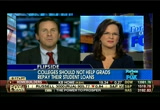tv Forbes on FOX FOX Business February 17, 2013 9:00am-9:30am EST
9:00 am
>> what did chuck, charles payne's starting the year strong and n he has three stocks to keep big ball rolling, iuess. what are you going to do? >> like aruba networks. byod, you'll learn that pretty soon. bring your own device. every business will say, i don't care if you got iphone, whatever, bring it. we'll have a system so you can use it even with our fire walls. this company makes that possible. green mount coffee. everyone knows the coffee. hate it.
9:01 am
i don't know why they're still king market share. starbucks didn't do so well. i like this major breakout. finally, first solar, how i learned to love the bomb. no, i hate the way the government is doing it, but i accept it for the next four years they're going to pile so much money into this area, this stock probably takes off big time. >> adam? >> i don't like going against charles when it comes to stock picking any of the time. but the one that i love the most here, charles, is first solar. i think solar is a great idea, but this company loses money and gets beaten up by the chinese. i would stay away. >> the chinese are kicked out of the market. they got those tariffs. >> details, details. dave is on now. well, if at first you don't succeed -- >> today no area holds more promise than our investments in american energy. >> the president making new calls for more green spending. the same week a government report revealing some major
9:02 am
misuse in a green grant. 150 million taxpayer dollars going to electric battery company where inspectors found employees playing video games, card games, cards, working at animal shelters, all while on the clock. and the only batteries they're building, so far they're in south korea. we keep hearing stories like this. so at a time when we're desperately looking for places to cut the federal budget, is this a perfect place to start? hi, everybody. welcome to "fbes on fox." let's go in with steve forks, rick you thinker, elizabeth mcdonald, morgan brennan, rich carlguard and mike. steve, if you want to cut waste, is this the place to start? >> sure, david. green energy a great place to save green dollars. if green energy had any promise, entrepreneurs would be in on it. in terms of clean energy, we have it in our backyard with natural gas, remove obstacles to that, we'll have all the clean
9:03 am
energy we want and need and export it. >> rick, you're against government waste. this was an incredibly wasteful program. is this the place we should start cutting? >> i actually came up with a very short quote that i think speaks to this point better than i could ever hope to. so i'm gog read it. federal investment in science and basic research has led to numerous innovations and commercial successes from laser lasers, from the internet to mri scanners. do you know who said that? mitt romney in his book "no apology, the case for american greatness." that is the point. look, government has always been involved in our greatest progress, they're always going to be involved. all the things we count on today, government played a role in. there have always been the sad saps and the nay sayers who want to just not move forward, leave things as they are. these investments are critical. and by the way, the actual losses that we sustained in this clean energy supporting programs, 3.6% have gone wrong. that's about a third of what the
9:04 am
estimate was -- >> mike, the lists are as long as my a. companies like a 123. it's not just solyndra. evergreen solar, beacon power. we've long list of cpaes that havave either failed or are failing that we've tried to pump up with government money. >> david, with my research, i found 14 failing solar companie that have already cost taxpayers over $3 billion. if president obama wants to play venture capitalist with taxpayer money, he should remember this: that the type of progress that rick is alluding to is in ear stage r and d. it's not in giving huge vast sums of taxpayer money for companies to operate and tax credits forever. this is the big problem for obama. the private sector, which would buy these goods, doesn't want them. >> perfect example of that, morgan, is electric cars. they keep trying to fist electric cars on the american public. they don't want them. tesla has a new electric car.
9:05 am
they have over $400 million in loan guarantees for the federal government. turns out, according to the "new york times," they don't deliver what they promise. >> yeah. i'm going to stay away electric that issue right now for a little bit. what i am gog say is, yes, are seeing a lotf waste and i do think there is a lot of room to streamline that waste. but i don't think we should be cutting off all green spending. going back to president obama and what he pitched this week in his state of the union speech, he's talk being a $2 billion clean energy transportation fund. yes, he talks about electric vehicles. i have my issues with those. but he's also talking about going back to steve's point, natural gas and domestically produced biofuel. if we want to compete against on the world stage, against china or india or brazil, then we need to be look at those aas. >> we need in the gas. i wish he would tell the epa that. rich, what about the argument that rick made, which is we're always hearing about government being the pioneer, that government is the seed capital for innovation. is that true? >> he makes half a point, you
9:06 am
know. but the structure is all wrong. if you look -- so many of the examples that rick talked about, chiefly the internet came through military r and d. military r and d -- al gore. military r and d works because there is a sense of urgency. there is an exist tensionial threat. the actual development of the companies, when john f. kennedy said we're going to put a man on the moon by the end of the 1960, the reason that we were able to do so and leap ahead of the soviet union is because of the semiconductor companies in silicon valley. yeah, the military bought a lot of semiconductor tips during that period. but guess what? these we privately funded companies and they had p and l's they had to worry about. that's the key difference between these green technology boondoggles. >> so e mac, are they all boondoggles? do they pay off or not? clearly the one we mentioned at the beginning is a boondoggle. >> the ones we have now are boondoggles.
9:07 am
i agree with rick. the technologies that seem to be working coming out of the government come from nasa or the military. and that's what we're seeing working. of course, a lot of spaghetti taxpayer dollars thrown against the wall. the market don't want electric cars or electric battery cars. it leaves them feeling like they'll be stranded in the woods without any gas or any power to get out of the woods. it stresses them out. so we talk a lot also about nat gas, yes, it's helped by the federal government, but that was a resource that was sitting there. electric batteries had to be developed by pople with a lot of taxpayer money. >> morgan, even folks like from the "washington post," charles lane, was talking about how americans just don't want electric cars. for all the money we pour, for all the tax breaks we give to people who buy them, americans still don't want them because they deliver inferior performance at a much higher cost, like much of what the government does. >> yeah. so going back to my point, we
9:08 am
streamline where we're make these investments and there is a wealth of data that shows that some of these investments have been very wasteful. going back to natural gas, there is a lot morehe government can do. great example, we should be building out infrastructure with some of our green money to be ship to go places like china where demand is skyrocketing. >> a big battle over that right now. the question is, which side the president will come down on. but steve, the fact is that so often behar lip service given to things like natural gas. but look where they're spending the money and it's on these battery issues that always fail, or wind mills that don't perform as they're claimed. >> yeah. rich made a good point about r and d, government has a role in r and d. but in terms of development, it's got to be the private sector and liquefied natural gas, the government will block a lot of those facility attention, even though some are up and ready to go. so we've got a huge market. here and around the world. let's remove the obstacles. that is clean energy. we have it already. >> rick, what about that? natural gas, if we want to go
9:09 am
with some kind of government support for things that will get us independent from the oil sheikhs, go with natural gas. >> i have no problem with natural gas. the president has it right with all of the above. >> the president says that, but he's not doing it! that's the point. tell that to the epa. >> did you know that when the original car was invend, when it came about, americans di't respond to it. they thought the horse and buggies were fine. >> so you think -- [ laughter ] >> you think eventually americans will grow to love the electric -- hold on a second. eventually american also grow to love the electrical car? >> yes, it will. >> until that happens, we have to pour all these billions into it. do you agree, steve? >> absolutely not. entrepreneurs will do it. what made the car something working people could afford was henry ford, he did not work for the raw government, got no money from the south government. he did it on his own and that's wait it should be done. >> there is no venture capitalist who is going to put in their portfolio all of those battery operated cars because
9:10 am
they know the markets don't want it because people get stressed out. they know they'll be stranded if the battery runs out. people want gas. these are going to be expensive toys to drive to the neighborhood grocery store. >> rich, the fact is -- hold on a second. we have another example of this, which is wind power. for 20 years we have been subsidizing wind power. we just agreed to spend another $12 billion on wind power in the last budget deal that was made. and over 20 years, it cost more to get energy from wind than it did 20 years ago before we began, rich. >> yeah, you know, funny enough you mention that. on saturday i was riding my bike where there are all kinds of wind mills in northern california. it was so windy, i almost got blown off my bicycle and yet, not a single wind mill was turning. explain that o. >> i don't think those are ever going to pay off. we got to leave it at that. coming up next, one college is getting a lot of praise for helping struggling graduates repay their loans.
9:11 am
9:12 am
don't the forbes folks like it? the flip side is we asked total strangers to watch it for us. thank you so much. i appreciate it. i'll be right back. they didn't take a dime. how much in fees does your bank take to watch your money? if your bank takes more money than a stranger, you need an ally. ally bank. your money needs an ally.
9:14 am
9:15 am
john says wrong. john, explain the flip side. >> this is just a terrible idea. it's very anti-college student, to what you want senior year, realistically is to be scared to death if you can't find a job, you can't pay off your loans. here is a program that will tell students don't worry what happens senior year. worst case, we'll coverour down side. it's so antistudent and it's not going to go national. there is no way. >> so john is all for the fear factor, the fear factor is what gets people out there to get a good job. >> it scared me just listening to him. i love this idea. i think it's great. finally a private college stepping up and saying, let's think about the american family. let's think about the students first. i wish other colleges would cut tuition first and not gouge american families. but i think this only works at the private level because we've got these public universities operating on the taxpayer nickel. i don't think the taxpayer will go for that. >> steve. >> a good experiment or not? >> they have a right to make
9:16 am
that experiment. but why don't they use that money to cut the tuition in the first place? not have that disincentive to find the better paying job. how about getting more bloat out of not just that college. i'm sure there is a little bit, but out of universities, which have expanded in terms of their administrative costs because it's subsidized by the u.s. government. by the way, david, all of this is going to be academic as on-line education comes on and you get $1,000 what you're paying $50,000 for. >> don't tell me that. i'm paying $6,000. morgan, nobody is closer to school debt than you are. you still paying it off >> i am, and i will be for 25 years. so i'm all for this concept. and actually i would even take it a step further and shift it the government like we've seen this ide of loan repainment contingent upon income like we see in the u.k. and australia. i think there is a lot of accountability lacking on the graduation end of student education. and i think more than that, it's also the fact that so many of our students are getting
9:17 am
educated for jobs that don't exist instead of the ones that do. >> mike, what about this idea? >> this is an idea, david, that must have come from the obama administration. [ laughter ] it pushes redistribution of wealth and disincentives to word of knowledge as john pointed out, why am i going to look for a job when i know that somebody that has a job and pays tuition at the school will help pay for my tuition? i don't like this idea. >> that's true. rich, the fact is it may cost more than 20,000 a year to pay off the debt, so maybehey'll say, i won't work for a $20,000 a year for a couple years and let the college pay off my debt. >> for this little private institution, it's a hail mary pass. steve put his finger on the issue. on-line technology will blow away 25 to 50% of colleges over the next ten or 20 years. so why not let them try? it's a private institution. it's a donor -- if the donor base doesn't like it, they'll let them know soon enough.
9:18 am
draw the line. don't try it at a public university, but small liberal arts college, private college, why not? >> morgan, what about that? if it's kept in the private level, are you for extending this into public colleges and getting the government involved? >> i'm definitely for it on the private level. i'm not so sure how i feel about it on the public level. if we shift it to the government, i'd be all for doing this across the board with all loans. >> there is no such thing as private college. >> i'm interested in john's incentive argument, when you have this massive piled mound of debt. >> disinventive. >> that's true. you got to get a job to pay off your loan. that's an interesting part of the argument. >> that's the point, you want the fear factor to get a job. let's end the myth about private colleges. all collegein the u.s., with the exception of two that i can think of, are reliant on federal student loans to put the students through. so this notion that somehow we
9:19 am
can limit it to private schools, we are gog pay for this. >> morgan, what about mike's argument about a disincentive, that this will -- maybe people will be reluctant to get a job for more than 20,000 a year 'cause they want the college to pay off their debt. >> the bottom line is people have to pay off their student loans. you can't declare bankruptcy on it. we still have the highest unemployment rate among young adults right now. i don't think that's going to change. i think americans, young adults that want jobs will get jobs no matter what. they want to be able to work. >> last word, the only person still paying off her school debt. are these union protests outside the capitol the reason why nothing is getting done inside the capitol? the "cashin' in" crew will discuss it. first, a $15 billion government program to revamp foreclosed homes. the president's calling it a jobs plan. jobs plan. but will it
9:20 am
did you know not all fiber is the same? citrucel is different- it's the only fiber for regularity that won't cause excess gas. 's gentle and clinically proven to help restore and maintain regularity. look for citrucel today. 's gentle and clinically proven to help restore and maintain regularity. yep, there i am with flo. hoo-hoo! watch it! [chuckles] anyhoo, 3 million people switched to me last year, saving an average of $475. [sigh] it feels good to help people save...
9:21 am
9:23 am
>> a new $15 billion plan for homes and jobs. president obama says sprucing up vacant foreclosed homes will help rebuild the job market. rich, you say it's not going to work. why not? >> because they're fake jobs. they're jobs that don't lead to other jobs. what we should do is create enterprise zones that jack kemp talked about, low tax, rates and so forth that incentivized business to come into these bombed outlaces whe there have been tremendous job losses
9:24 am
unless you see all these mortgage forecsures. we need real economic growth and some employers who create jobs. not the government. >> rick, is this just another government make work program? >> it is so not rich. i'm going to say something to you i rarely say. you are absolutely wrong. my hometown of youngstown, ho o you have seen this in action. this has really happened. they did exactly what the president has suggested here. they tore down all the urban blight. they created parks. they created commercial buildings. they've improved residential. and they have come so far. three years ago, forbes called them one of the greatest dying cities in america. today the president is talking about them in the state of the union. they have turned the corner. this actually worked. i'm happy to take you all with me to see it. >> morgan, could this not only turn communities around, but really create jobs? >> you know, i love that concept, but it's a day late and a dollar short. we're already seeing the private market all over this. about $10 billion estimated by
9:25 am
jp morgan from the private sector going into these projects already. we lost 2 million construction jobs in the down turn. we've soon 300,000 add. if you look where they've been added, that's in new home construction and it's in trade contractors. so we're talking about remodeling and maintenance of buildings already existing. you want to create jobs? create jobs around infrastructure because those are the construction workers that are still out of work. >> and steve, the thing about fixer uppers is people buy places that are distressed thinking that if they fix it up them they was, they'll be able to turn around and make a nice profit. >> sure. people in the private sector will do those homes a lot faster and cheaper than the government will. and the reason why youngstown is turning around is because ohio has a republican governor who is pro business. [ laughter ] >> all right. john, at about the specific one, $15 billion is what the president wants to spend. he says it will create jobs and you say? >> yeah. i'm listening to rick. he resides in the scene of the world. he sees those jobs created in
9:26 am
youngstown and says, oh, wow, look at what the government can do. but the good ideas will be starved of capital sos bad ideas can receive it in abundance. yes, they'll spend the $15 billion and jobs will be created in one area. but at what cost? >> what do you say to that? >> that's a very strange argument. in other words, it's wrong 'cause i've seen it work? is that what you're saying? that makes no sense. > you're looking at the observable reality. what you're missing are the businesses that never receive funding. the good idea that the markets want that never receive funding and jobs never created because we're funding ideas that you like with the money of others. >> rich, have you ever seen these kind of programs work at all? i moon, youngstown, ohio or anywhere else? >> you know, i think liberals like rick always go back to the 1930s when it seemed like all these wpa projects worked, but we had a different environment then. we didn't have public sector unions. we didn't have all these regulatory barriers.
9:27 am
the problem is that the things that rick talks about are so much more expensivehen administered by the government than they would be by the private sector. >> you got ten seconds, wrap it up. >> working today! it's 20 and. it's working now. it's -- >> no it's not. >> it's also working in flint, michigan, this exact program it's bringing business in. doing all the things you like. >> we got to wrap it up at that. coming up, mountain dew.
63 Views
IN COLLECTIONS
FOX Business Television Archive
Television Archive  Television Archive News Search Service
Television Archive News Search Service 
Uploaded by TV Archive on

 Live Music Archive
Live Music Archive Librivox Free Audio
Librivox Free Audio Metropolitan Museum
Metropolitan Museum Cleveland Museum of Art
Cleveland Museum of Art Internet Arcade
Internet Arcade Console Living Room
Console Living Room Books to Borrow
Books to Borrow Open Library
Open Library TV News
TV News Understanding 9/11
Understanding 9/11




























